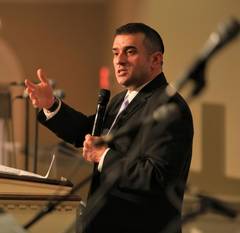- About Us
- Learning
- Resources
- Get Involved
- Membership
- Jobs
Loss and Longing at Thanksgiving
11/24/2021 12:01:38 PM
Rabbi Brent Spodek
| Author | |
| Date Added | |
| Automatically create summary | |
| Summary |

Dear Friends:
Thanksgiving is a difficult and wonderful holiday, all at once. On the one hand, our culture is saturated with a whitewashed lie of brotherly love between Native peoples and European colonists. More information about the history of thanksgiving can be found here.
On the other hand, for many of us, the power of Thanksgiving is not the mythic history, but the opportunity to gather with friends and family and give thanks for the blessings we enjoy.
In Jewish thought, Thanksgiving is not an annual tradition, but a practice we are invited to every time we step into prayer, which traditionally is three times a day.
The structure of the Amidah, the central prayer of Jewish liturgy, brings us thankfulness through a very specific path. Again and again it has helped me through difficult moments; perhaps it will be of help to you as well.
The Amidah is built on a three part structure - shevach, bakashot and hodaot, or Wow, Please and Thank You.
Shevach, or WOW (more literally, praise) is the central religious posture of what Rabbi Abraham Joshua Heschel calls “radical amazement.” We exist because matter that was once part of an exploding star has coalesced into us, we eat because plants turn sunlight into sugars and we breathe because other plants pump out oxygen. That we exist at all is simply awe-inducing; that we endure at all is grounds for praise and devotion.
The Amidah moves next into bakashot, or PLEASE (more literally, requests). Incredible though it is, existence alone is that all that most of us want from life. We want to love and be loved, we want to enjoy health, we want to find work that is meaningful and sustaining. We all long for things we don’t have. There is not a God in the sky waiting to give us what we long for if only we ask nicely. There is, however, an ache in our heart, a fear of the pain that emerges from longing. Naming our fears is part of taming them. Simply to articulate what we long for, what we are lacking, is a huge step towards diminishing the power that our fears have over us.
Last, the Amidah moves into hodaot, or THANKS (more literally, thanksgiving). Having just expressed our longing for what we don’t have, the Amidah asks that we give thanks for what we do have, even if what we have is not everything that we want. It is possible - common, really - for pain regarding what we lack to eclipse gratitude for what we have. Our desires will never be fully met. As Qohelet teaches, “The eye never has enough of seeing, nor the ear enough of hearing,” and so the Amidah has us end our prayer not with longing, but with thanksgiving.
As we head into this Thanksgiving, we cannot lose sight of the awesome reality of simple existence, we cannot pretend the pain we feel over the things we miss is not there, and we cannot allow that pain to be everything we experience.
I pray that whether you are alone, with your immediate family or have traveled to be with extended family, you can walk the path of the Amidah and articulate, by yourself or around the table, your own personal Wow, Please and Thank You.
With blessings,
Rabbi Brent
Thu, December 4 2025
14 Kislev 5786
RABBI BRENT SPODEK

Join Our Mailing List
Privacy Settings | Privacy Policy | Member Terms
©2025 All rights reserved. Find out more about ShulCloud


